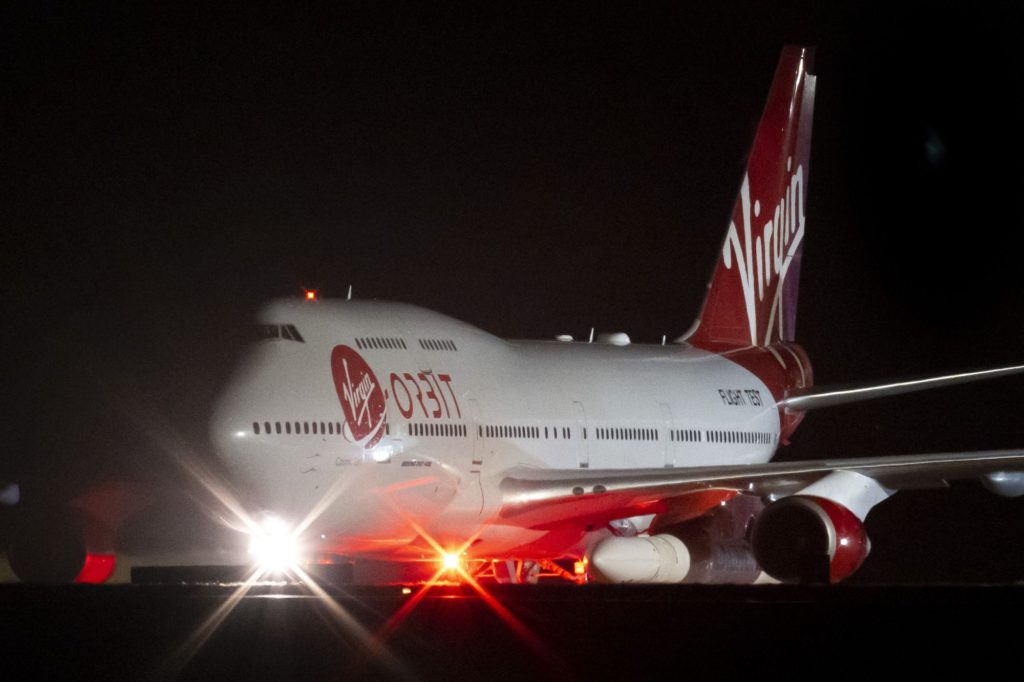(Bloomberg) — Richard Branson’s Virgin Orbit Holdings Inc. slumped more than 20% early Tuesday after the company’s first launch out of the UK failed to reach orbit due to an unknown mishap mid-flight.
(Bloomberg) — Richard Branson’s Virgin Orbit Holdings Inc. slumped more than 20% early Tuesday after the company’s first launch out of the UK failed to reach orbit due to an unknown mishap mid-flight.
The failure dealt a blow to Britain’s bid to join the ranks of space nations, as the launch was set to be the first orbital mission to take off from British soil.
While failed space shots aren’t unusual, the unfortunate outcome of the UK endeavor carries additional weight after the patriotic fanfare that had been attached to putting Britain — a world-leading satellite producer but lacking launch capability — on the space map.
It also raises questions about the unprofitable company’s ability to deliver on plans to accelerate the pace of launches. Virgin Orbit’s stock, which traded above $10 a share this time last year, slid 22% to $1.50 as of 9:34 a.m. in New York.
The rocket, launched from a Boeing 747 jumbo that took off from southwest England, suffered a malfunction deep into the mission, leading to the loss of its payload of nine satellites. The crew of the aircraft returned safely.
After decoupling from the aircraft, the rocket ignited its engines, went hypersonic and reached space, where it separated and ignited the second-stage booster, the Long Beach, California-based company said.
“At some point during the firing of the rocket’s second-stage engine and with the rocket traveling at a speed of more than 11,000 miles per hour, the system experienced an anomaly, ending the mission prematurely,” it said.
Chief Executive Officer Dan Hart said in a statement that Virgin Orbit will work to understand the nature of the failure and take corrective action, and aims to return to orbit “as soon as we have completed a full investigation and mission assurance process.”
Virgin Orbit said in a November earnings statement that it was planning to more than double the 2022 launch rate this year, something that now appears extremely unlikely. The company’s third-quarter net loss widened to almost $140 million, with Branson’s Virgin Group providing a $25 million injection to bolster operations.
Ian Annett, deputy chief executive officer at the UK Space Agency, told the BBC that Virgin would be carrying out “a full review of the data over the next few days to determine exactly what went wrong.”
UK plans for another launch in the next 12 months remain intact, Annett said, whether from Cornwall or another of seven planned space pads, among them a vertical launch center in the Shetland Isles off Scotland.
Start Me Up
The failed mission, named Start Me Up after the Rolling Stones song, had carried satellites for seven customers, including a number for UK firms, a US-UK military mission, and Oman’s first-ever orbiter.
Deployment of small satellites has surged amid the drive to create new mega constellations for broadband communications. Global launches, many of them by privately held enterprises like Elon Musk’s Space Exploration Technologies Corp., have increased threefold to 1,700 satellites a year since 2012 and are expected to double again by 2030, according to the UK Space Agency.
Virgin Orbit had put plans for a pre-Christmas launch on hold amid last-minute snags, but managed to get the mission away in the first of multiple new windows it set out.
The modified 747 “Cosmic Girl” took off from Spaceport Cornwall at 10:02 p.m. local time, carrying the LauncherOne rocket beneath its wing. At an altitude of roughly 35,000 feet, LauncherOne successfully deployed and fired up, at which point the mission appeared headed for success.
Confusion arose after Virgin Orbit prematurely tweeted that the launch had reached orbit. However, later it said an anomaly occurred that prevented the rocket reaching orbit and deleted the initial tweet. It added that the mission nevertheless “represents an important step forward.”
Besides the so-called horizontal launch attempted yesterday from Spaceport Cornwall in Newquay, southwest England, two Scottish bases are also committed to Cape Canaveral-style vertical blastoffs by the end of the year, while three other UK sites are seeking the go-ahead for horizontal launches.
Yesterday’s launch was Virgin Orbit’s sixth attempt to reach orbit, and the second in-flight failure. So far, the company has successfully launched to orbit four times from the Mojave Desert in California.
(Updates with Virgin Orbit shares from fourth paragraph.)
More stories like this are available on bloomberg.com
©2023 Bloomberg L.P.










